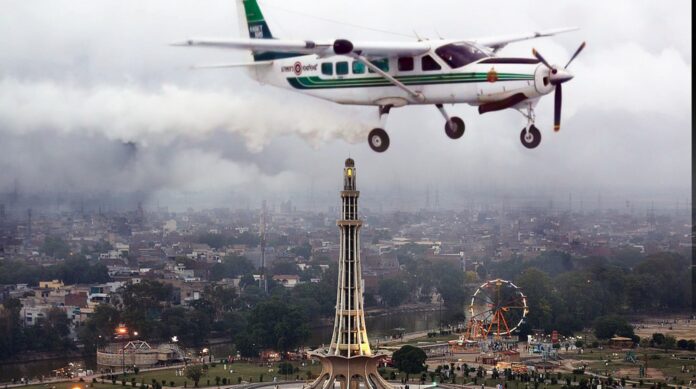The Punjab government has successfully conducted a trial of local technology for artificial rain to address the severe smog affecting the province.
The ‘cloud seeding’ process was carried out in Jhelum, Gujar Khan, Chakwal, and Talagang, with rainfall occurring within hours in the first two locations. The initiative was a joint effort between the Punjab government, the Pakistan Army’s Scientific Research and Development experts, Army Aviation, Pak Arab Refinery Limited (PARCO), and the Environmental Protection Agency.
This collaborative effort utilized advanced local technology and expertise to complete the trial successfully. The artificial rain aims to reduce smog, which has significantly lowered visibility in cities like Lahore and Multan, increased respiratory risks, and led to school closures and other restrictions. Lahore, with a population of 14 million and numerous factories near the Indian border, frequently ranks among the world’s most polluted cities. This month, it has reached record pollution levels, prompting authorities to take immediate action.
As winter air pollution worsens, Punjab’s capital has topped the global air quality index as the most polluted city for much of the week. Punjab Chief Minister Maryam Nawaz Sharif praised the success of the artificial rain experiment, noting that it could pave the way for future technological advancements to tackle environmental challenges.
In response to the toxic smog, the Punjab government declared a health emergency on Friday, imposing a ban on construction, extending school closures for another week, and shifting universities to online classes. Thousands of people gathered in over 600 mosques across the province to pray for rain and relief from the health hazards caused by the smog.
The region, which faces smog problems every winter, has seen air quality deteriorate in recent years due to trapped dust, low-quality diesel fumes, and smoke from illegal crop burning. The lack of rainfall this year has intensified the pollution, with experts attributing it to the dry conditions in September and October.
Senior Minister Marriyum Aurangzeb announced further smog reduction measures, including the closure of construction sites, brick kilns, and furnace-based plants in Lahore and Multan. She warned of a potential three-day lockdown if the pollution situation does not improve.
Schools were already closed until November 17, with online learning extended for another week. Colleges and universities are also shifting to virtual classes. Public spaces, including parks and zoos, have been closed to the public.
Punjab also blames neighboring India for contributing to the region’s pollution, with New Delhi, ranked as the world’s most polluted capital, enforcing similar measures to tackle its hazardous air quality.




